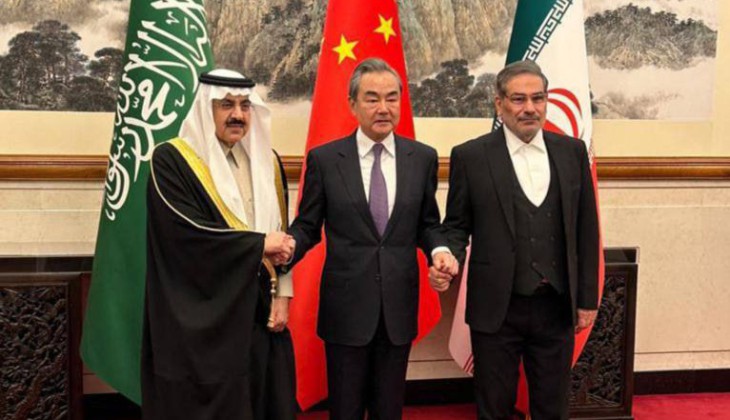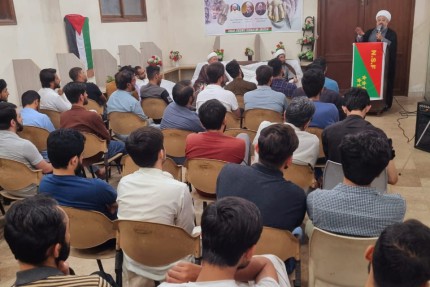Negaheno special edition
Key points on the Iran -Saudi Arabia AgreementIran

today was signed with the mediation of China when Oman and Iraq had also previously played a key role in signing of the agreement.According to Negaheno report with the joint statement that was signed on 10th March ,2023 at the end of the joint tripartite negotiations between China
, Iran and Saudi Arabia represented by Ali Shamkhani, Secretary of Iran Supreme National Security Council, Mosaed bin Mohammad Al-Aybian, Advisor to the Saudi Arabia national security and Wang Yi, member of the political office of the central committee of the Communist party in Beijing, the two countries agreed to resume their diplomatic relation within two months’ time and open their embassiesThere are few points to consider in this regard:
1- The bilateral negotiations between Iran and Saudi Arabia were requested by the president of China during the recent visit of our president to this country together with the secretary of the supreme national security council with the aim of developing and restoring bilateral relations.
2- This agreement which is the outcome of several previous negotiations between the delegations from both sides in Oman and Iraq and five compact days spent on negotiations is a beginning of an end to the 7 years of stalemate between Riyadh and Tehran ties which can be a turning point in the history of the bilateral relations.
3- Based on the contents of the agreement the resumption of bilateral ties between Iran and Saudi Arabia and the negotiations between the two countries have been transparent, clear, multilateral and constructive and are with the aim of resolving misunderstanding and forward looking in the Riyadh -Tehran ties, which would help develop regional security and stability, increase cooperation among Persian Gulf countries and the Islamic world for better management of the existing challenges.
4- The unofficial negotiations were resumed between Iran and Saudi Arabia from 2 years ago and under the supervision of the national security council. The negotiations in the 13th government that pursues policy of expanding friendship and good neighboring relations with the Islamic countries in particular with the neighboring countries as part of its agenda was pursued with enthusiasm. Naturally, the various outcomes of overcoming hostilities between Tehran and Riyadh cannot be agreed by the hostile countries such as America and the Zionist regime.
5- In view of the importance of the results of the negotiations which is a follow-up of the policy of development of relations with the neighboring countries as a key strategy of the 13th government will have a key positive impact on the ties between the two great countries of the world of Islam for the development of both countries and the Persian Gulf countries.
6- This is while that the development of friendly relations between the two Islamic countries may get hurt by those against the expansion of peaceful relations between the Islamic countries and the Muslim nations.
7- In the past two years the governments of Iraq and Oman have hosted the previous meetings for Iran and Saudi Arabia and have played a constructive, innovative and admirable role
Comment
- Behind the Scene of the Attack in Oman, Operating Schemes that Intend to Destabilize the Country
- Trump’s Assassination Was a Ridiculous and Pre-organized Drama
- The Syrian senior analyst Views Towards the Letter of Iran’s President -Elect to the Secretary General of Hezbollah of Lebanon
- The hard way to political agreement in France/ Will Macron remain in power?
- Navigating the Caspian: Energy, Trade, and Geopolitical Harmony
- Behind the Scene of the Attack in Oman, Operating Schemes that Intend to Destabilize the Country
- Trump’s Assassination Was a Ridiculous and Pre-organized Drama
- The Syrian senior analyst Views Towards the Letter of Iran’s President -Elect to the Secretary General of Hezbollah of Lebanon
- The hard way to political agreement in France/ Will Macron remain in power?
- Navigating the Caspian: Energy, Trade, and Geopolitical Harmony
- Holding Public Court in Damascus to Put the Zionist Regime on Trial
- Boycotting Israeli Athletes for the Olympics in France Is Indispensable
- Iraqi Media Activists Arrested in Saudi Arabia/ Using the Hajj pilgrimage for settlement with the opponents
- Syrian Journalist and Author Tabib Ahmad Al-Darzi’s Analysis on Ali Bagheri’s Trip to Syria
- What Does it Mean on the Verge of Collapse and Has Israel Reached This Stage
- We Stand in an Era of Fundamental Changes/the World’s Political Literature is Changing
- The Art of Soft Power: How Khomeini and Khamenei Used Words to Transform the World
- Mey Sobhi Khansa’s views towards the Hague court verdict and the martyrdom of I R Iran president
- Behind the Scene of the Attack in Oman, Operating Schemes that Intend to Destabilize the Country
- Trump’s Assassination Was a Ridiculous and Pre-organized Drama
- The Syrian senior analyst Views Towards the Letter of Iran’s President -Elect to the Secretary General of Hezbollah of Lebanon
- The hard way to political agreement in France/ Will Macron remain in power?
- Navigating the Caspian: Energy, Trade, and Geopolitical Harmony
- Holding Public Court in Damascus to Put the Zionist Regime on Trial
- Boycotting Israeli Athletes for the Olympics in France Is Indispensable
- Iraqi Media Activists Arrested in Saudi Arabia/ Using the Hajj pilgrimage for settlement with the opponents
- Syrian Journalist and Author Tabib Ahmad Al-Darzi’s Analysis on Ali Bagheri’s Trip to Syria
- What Does it Mean on the Verge of Collapse and Has Israel Reached This Stage




